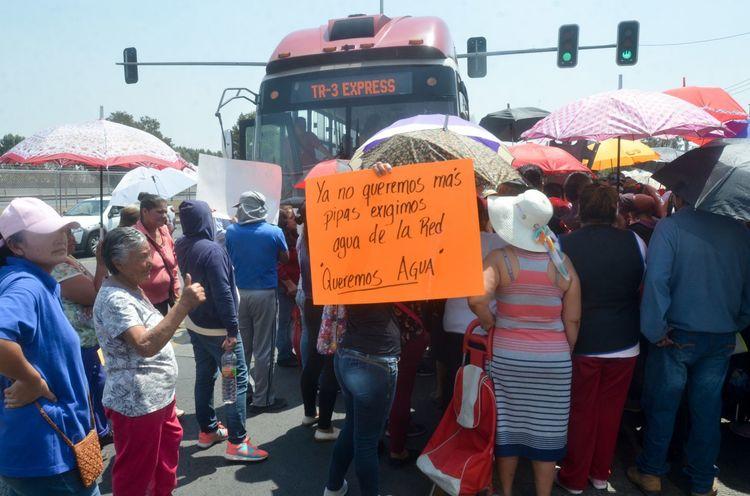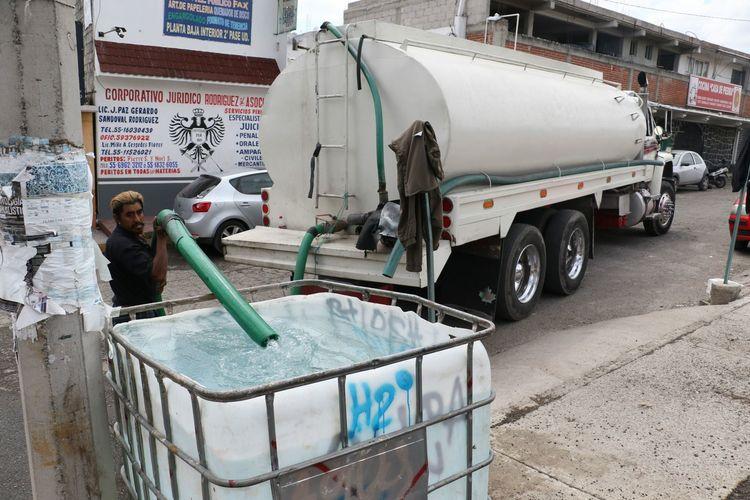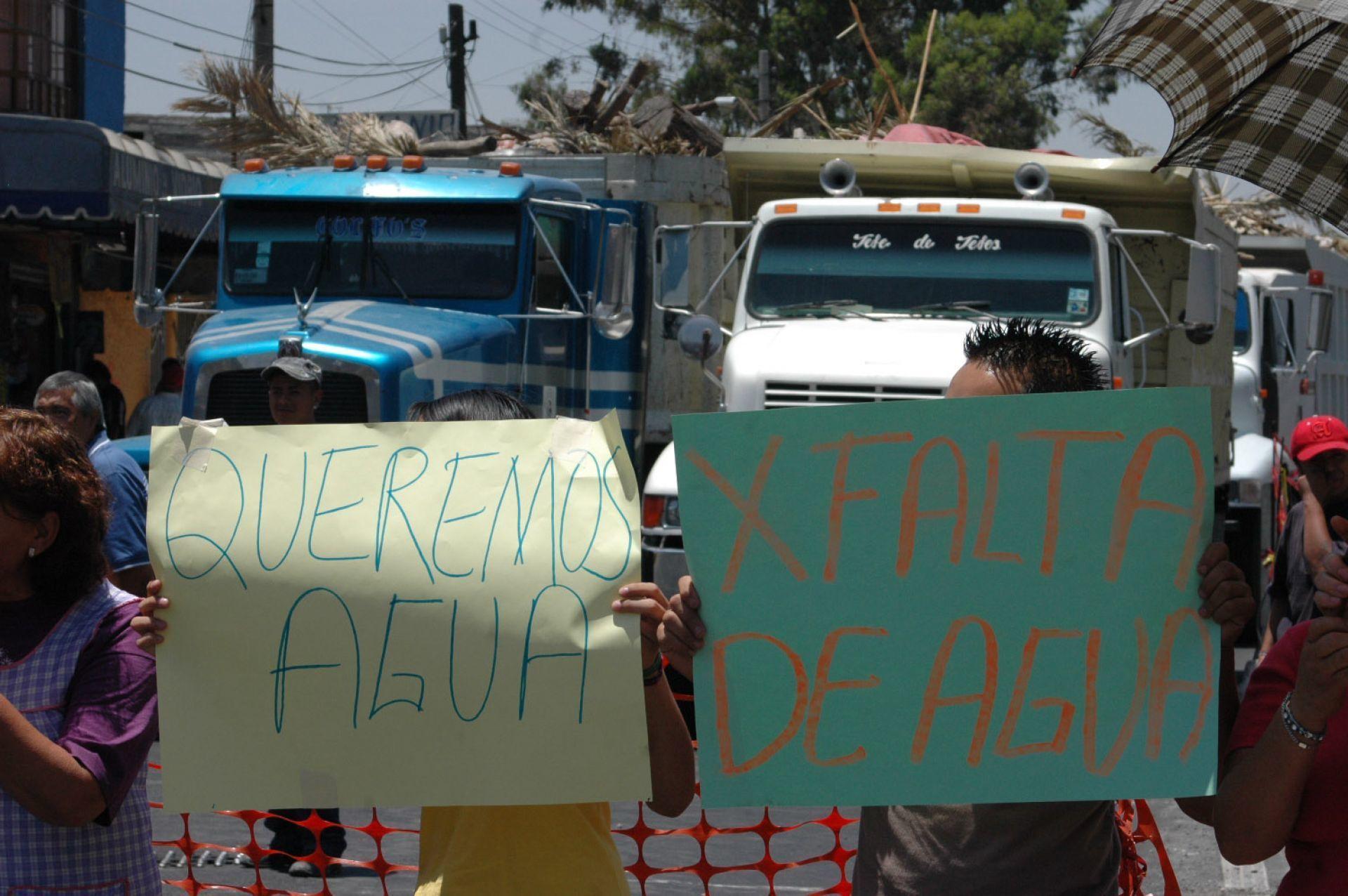In Ecatepec, the second most populated municipality in Mexico, there are colonies up to 30 years old without access to water. The shortage and high prices of pipes led a group of women to organize to seek solutions.
One of the pressure measures was to carry out a blockade of Central Avenue last June that lasted 22 hours until the police came to evict them.
The solution proposed by the government was the same as always: maintaining the supply with pipes. A supply that has become a business, its inhabitants denounce.
“Pipes sell (water) at excessive prices. We have seen them formed in wells carrying water that they will then sell to the colonies. Here people make a very logical argument, where does the water sold to us in the colonies come from? , because it comes out of the wells in Ecatepec, because Ecatepec does have water, but they're putting it in pipes,” explained Elsa Arroyo, a defender in this municipality in the State of Mexico.
Elsa, together with neighbors from neighborhoods in the Fifth Zone, as well as those from Laguna de Chiconautla and La Guadalupana, decided to create a Committee of Women Water Defenders in Ecatepec.
The decision comes after a couple of years of publicizing the problem of the water crisis in the media and carrying out the blockade on Central Avenue, where they were intimidated. Arroyo even had to file a complaint with the Cyber Police because, after the demonstration, her image began to circulate on social media pages in Ecatepec accused of being an extortionist, as well as receiving threats by message.
The objective of the Committee will be to organize round tables with authorities to seek to influence the supply and stop what they consider to be a political capture of this resource. This initiative is supported by Women, Democracy and Citizenship (Mudeci), a civil association located in the municipality to which some of the defenders also belong.
“Our motto is 'Water through the network for Ecatepec' because people no longer want pipes, what they want is water that comes directly from the tap,” said Elsa.

Blockade of Central Avenue to demand water supply in Ecatepec. Photo: Armando Monroy/Cuartoscuro.com
Infected water and the costs of pipes
The organization of women to deal with the lack of water in Ecatepec began with the Covid-19 pandemic, despite the risk of contagion. Shortages were more common even in areas where there had previously been no problem, such as La Guadalupana, Casas Coloniales and El Calvario.
However, there are others who are between five and 30 years old with problems accessing water. Most of them are located in the Fifth Zone, a group of 154 colonies south of the municipality, including: Sagittarius VII, Sagittarius X, Alfredo del Mazo, Ciudad Azteca, Valle de Ecatepec, Fuentes de Ecatepec, Jardines de Casanueva, Fuentes de Aragón, Alborada de Aragón, La Nueva Aragón and Sauces.
“In addition, the infrastructure is in poor condition and some land here in the municipality is muddy, so the water that comes out through the faucet is brown, many (in the Fifth Zone) say they have animals. It's not quality water and they have to use it only for the toilet because it's not good for bathing or washing clothes, much less for preparing food,” said Elsa Arroyo.
Regarding the supply of water pipes, the defenders denounced that those that belong to the government and should be free are sent to areas where there are groups related to the current political party. While private 10,000-liter pipes can cost up to 2,200 pesos, this is double the average cost, they said.
The water pipe business has been recognized by President Andrés Manuel López Obrador. Just last October 24, when questioned by a reporter at a morning conference about this problem, he said that he visited Ecatepec and had made a commitment to increasing the volume of water to carry it from wells that were found when the Felipe Ángeles airport was built in Zumpango, State of Mexico.
“A lot of water was found there and there are surpluses. I made a public commitment that 100 to 200 liters per second will be brought to Ecatepec right away,” said the president. The intention is for water to reach people, but not through pipes, he said.
As for the local government, it was announced last July that a group of neighbors asked the Supreme Court of Justice of the Nation to seek an amparo over the lack of water and the request for the dismissal of Fernando Vilchis Contreras, the municipal president of Ecatepec.

Water pipe in Ecatepec. Photo: Saúl López/Cuartoscuro.com
A life without water
Despite the recognition of the authorities, there is still no effective solution that can change the water scarcity experienced by hundreds of people in Ecatepec.
Colonies where liquid from a couple of buckets is being reused for weeks are becoming more common; there are girls and young people who cannot go to school during their menstrual period due to lack of water; and there are families who struggle with not being able to change the sheets of their patients.
“People who can, because not everyone can, buy water pipes and spend between 18,000 and 25,000 pesos a year. There is an uneven distribution of water and the poorest people are paying the cost of scarcity,” said Elsa Arroyo.
As is the case in other regions of Mexico, the defenders of Ecatepec do not attribute the lack of water to a cause exclusively linked to climate change, but to the looting of a resource that should be guaranteed to all citizens.



Comentarios (0)